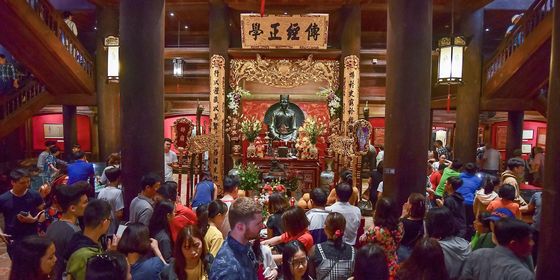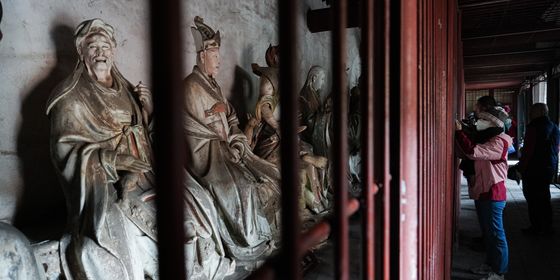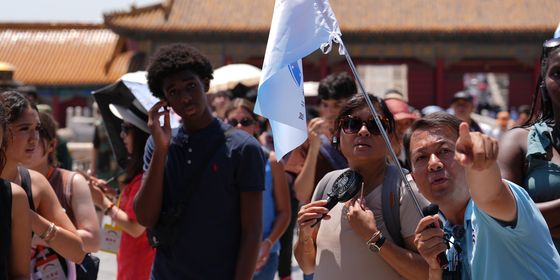Not every profession in China gets time off during Spring Festival
Chunyun (春运, “spring migration”), China busiest travel season, began this year on January 10 and will last until February 15, with travelers expected to make over 3 billion trips during this time.
Though associated with family reunion—and often symbolized by images of homebound migrant workers struggling with myriad transporation snafus—a Spring Festival vacation isn’t something every worker in China gets to enjoy. In some professions, such as those in the logistics sector, it may even be the busiest time of year, a fact usually acknowledged on CCTV’s annual Spring Festival Gala. Here are five professions that have to regularly sacrifice their time off during this most cherished of public holidays:
Medical staff
“I can no longer remember the number of New Year’s Eves when I’ve been on duty,” Huang Huaqi, a cardiothoracic surgeon at the Yinzhou People’s Hospital in Ningbo, Zhejiang province, told China News in 2018. Recently, the mental and physical well-being of hospital workers have elicited heated discussion due to two well-publicized murders of doctors by disgruntled family members of their patients, and being on-call during the holidays is just another routine stress of the job.
According to a 2018 report by the Chinese Medical Association, doctors at the nation’s “first-level” hospitals have to work on average 48 hours per week, while those at second and third-level hospitals worked over 51 hours a week. A viral music video released by a Sichuan hospital last August, titled “I’m a Doctor, Not a God,” alluded to many struggles within the profession, such as doctors having their sleep interrupted by emergency calls from the hospital. However, “I’ve become used to [the schedule]” Huang asserted. “If not me, then someone has to be on duty.”
Couriers

(Piqsels)
According to China Post, 1.61 billion packages were delivered between January 21 and February 10 during the Spring Festival season of 2019, a 33 percent increase from the previous year. This year, delivery giants like ST Express and YD Express have promised they will not suspend services during the weeklong public holiday, though will charge extra fees for sending packages during that time.
Couriers who do not take time off during the Spring Festival can receive bonuses of up to 3,000 RMB according to Cainiao, a delivery aggregator owned by Alibaba. “I volunteered to work over the Spring Festival so I can earn more money” Sun Hao, a courier employed by Cainiao, told Zhejiang Online. “I want to rent a bigger house and bring both my daughters to Hangzhou to go to school.”
Railway employees

(Piqsels)
In “Three Minutes,” Chen Kexin (Peter Chan)’s moving short film (and covert iPhone X commercial), a young boy has just three minutes to spend Spring Festival with his train steward mother on the station platform during a quick stop her train makes near their hometown. Chinese travelers are expected to make close to 11.3 million trips by train during this year’s chunyun, and 73 new routes have been added to accommodate the increased volume of travel. During the chunyun of 2019, 500,000 railway employees remained at their posts, according to the China Railway Corporation.
Traffic police

(Piqsels)
China’s highways are expected to see a 40-day travel rush over the holiday period, with 2.43 billion road trips taken, according to the National Development and Reform Commission. Apart from enforcing traffic rules, minimizing accidents, and reducing congestion, highway patrol officers often encounter strange and moving examples of travelers’ determination to get home for the holidays: In 2018, traffic police in Hezhou, Guangxi Zhuang Autonomous Region, saw a migrant worker attempting to walk 1,132 kilometers from Guangzhou to Zunyi, Guizhou province, in order to save money, pushing all of his possessions in a wheelchair. They safely escorted the man off the highway, after buying him some food and water.
Military

(Piqsels)
China began participating in the UN peacekeeping operations in 1990, and registered a total of 2,500 peacekeepers as of 2018. Peacekeeping brigades and other military units usually hold annual Spring Festival galas at their headquarters, featuring homegrown acts ranging from dance performances to a dragon parade. They and soldiers of the PLA also typically get thanked for their service during CCTV’s famous televised gala, usually accompanied by a video showing recruits enduring hardships in the line of duty and sending messages to their loved ones back home: “When I finish my term, I will bring back you a Blue Helmet medal…Take care of our parents.” Xu Libin, a peacekeeper based in Libya, said in a video call to his wife at his brigade’s gala in 2018.
Cover image from Wikimedia Commons












